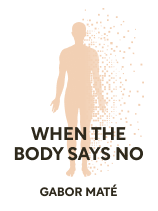

This article is an excerpt from the Shortform book guide to "When the Body Says No" by Gabor Maté. Shortform has the world's best summaries and analyses of books you should be reading.
Like this article? Sign up for a free trial here .
What is a stress-related illness? Can stress really make a person physically sick?
Although science treats the mind and the body as separate entities, there’s a strong connection between stress and illness. Dr. Gabor Maté discusses this connection in his book When the Body Says No, explaining the links between peoples’ life histories, psychological profiles, and specific diseases.
Here’s a look at some of the stress-related illnesses.
Diseases of the Nervous System
The first stress-related illnesses Dr. Gabor Maté discusses are ones that affect the nervous system. MS (multiple sclerosis) and ALS (amyotrophic lateral sclerosis, or “Lou Gehrig’s Disease”) are both diseases of the nervous system that can cause wide varieties of symptoms. According to Maté, both have also been associated with specific kinds of life experiences and personality characteristics.
It’s well known that MS flare-ups can be correlated with stress. But according to the research cited by Maté, doctors as far back as the late 1800s have also suggested a connection between life stressors and onset of the disease. Many studies since have found that people with MS are far more likely than average to have experienced trauma early in their lives, to have dysfunctional emotional issues relating to their parents, and to have other acute stressors.
(Shortform note: MS is characterized by lesions on the brain, which can come and go over the course of the disease; but the number of new lesions indicates progression of the disease. Strengthening the link between stress and the progression of MS, a 2012 study found that MS patients who participated in a weekly stress management program developed fewer new brain lesions than those who did not. One of the components of the program was to help participants assess and manage their responses to perceived threats.)
Additionally, research shows that ALS patients have some striking commonalities in personality characteristics. Maté describes this personality type as fiercely independent and driven, reluctant to ask for help, and in denial of negative emotions and pain. These qualities are considered highly admirable by others, thus Maté says he has noticed that ALS patients are particularly likable, pleasant people, and he says this is something that’s widely recognized in the medical community. Maté argues that this personality trait is a result of emotional repression formed by childhood experiences, and that these individuals often have parents who never allowed them to express themselves, either emotionally or in terms of identity. So they had to create an identity based on others’ expectations and cultivate a facade of emotional toughness.
(Shortform note: The namesake of ALS disease, Lou Gehrig himself, is described as having this personality type. He suffered several life traumas, including three siblings who died as children, as well as having an alcoholic father and an overbearing and controlling mother.)
Diseases of the Gut
The common diseases of the gut (IBD/IBS and GERD) are what Maté refers to as “functional” diseases, meaning the symptoms are unexplained by any biomedical explanation. He says that it’s well known that they’re often stress-triggered, and it’s also been found that sufferers of these conditions have a higher rate of abuse in their past than did the controls. He attempts to explain these diseases by looking at studies on the relationship between trauma and pain response.
According to Maté, experiencing physical or sexual abuse lowers one’s pain response threshold, especially in the gut, because of the sensitive gut-brain relationship and the abundance of nerve cells there. Maté says that “pain is a mode of perception” and because of the gut-brain relationship, our “gut feelings” help us know when we’re safe or unsafe.
(Shortform note: One of the personality characteristics that has been linked to Inflammatory Bowel Disease is alexithymia, which is defined as a difficulty with processing and describing one’s emotions. Individuals with alexithymia struggle to understand what they’re feeling, and they find it difficult or impossible to put those feelings into words. Not surprisingly, considering Maté’s research presented here, alexithymia has been linked to childhood trauma and neglect.)
Rheumatoid Diseases
In autoimmune diseases, such as rheumatoid arthritis, lupus, scleroderma, and ankylosing spondylitis, the immune system attacks one’s own body because it can’t distinguish between healthy and unhealthy tissues. According to Maté, studies have connected psychosocial factors to the onset, flare-ups, and severity of rheumatic diseases. Like ALS, he says, these people have a characteristic personality trait: what Maté calls “compensating hyper-independence”—often due to early loss of a parent or a role-reversal relationship with a parent. Flare-ups and pain are a signal that the body is saying no, Maté says. They cause people to slow down and avoid stressful situations.
Autoimmune disease most strongly illustrates Maté’s theory that disease may be connected to one turning against oneself, or inability to distinguish between self and other, both psychologically and physiologically, which we’ll discuss later. (Shortform note: A UK-based study showed that rheumatoid arthritis patients differed from control subjects on several personality characteristics, which would make them more vulnerable to stress-reaction dysfunction. Specifically, they rated lower than others on: adaptability, stress management, emotion management, self-esteem, sociability, assertiveness, well-being, and impulsiveness.)

———End of Preview———
Like what you just read? Read the rest of the world's best book summary and analysis of Gabor Maté's "When the Body Says No" at Shortform .
Here's what you'll find in our full When the Body Says No summary :
- How stress can manifest as chronic illness
- How to heal from and avoid stress-related diseases
- Why toxic positivity can make you sick






